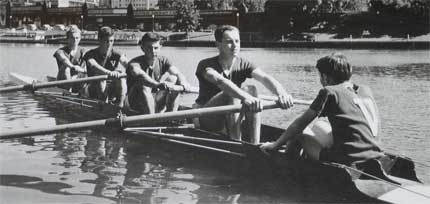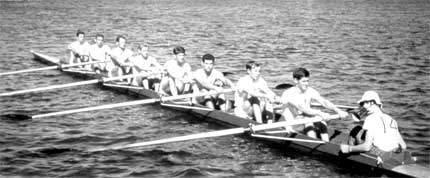History of Mercantile Rowing Club
Table of Contents
Chapters
- The River Yarra
- Early Rowing in Victoria
- The Beginnings (1880-1890)
- Mercantile in the Nineties (1890-1900)
- Sloan, Ivens and Fluctuating Fortunes (1900-1910)
- Dark Days and New Dawn (1910-1920)
- Years of Mixed Success (1920-1930)
- Through the Thirties (1930-1939)
- The Struggle for Survival (1939-1946)
- Building for Success (1946-1950)
- Mercantile to the Melbourne Olympics (1950-1956)
- Rowing to Rome (1956-1960)
- A Pink Cloud on the Horizon (1960-1965)
- The Storm and its Passing (1965-1966)
- A Clear Light Blue Sky (1966-1968)
- High Noon (1968-1970)
- A New Challenge (1970-1973)
- Fire and the Second Building Project (1973)
- Winds of Change (1973-1976)
- The Close of the Century (1976-1980)
- The Base for Success (1980-1984)
- Success (1984-1988)
- Oarsome Foursome (1988-1992)
- A Boathouse for the Best (1992-1996)
- The Rise of the Professional Coach (1996-2000)
- Golden Girls (2000-2005)
Appendices
13. A Pink Cloud on the Horizon (1960-1965)
Chapter Thirteen page 12
Mercantile's top senior oarsmen may have been licking their wounds in frustration after having been stranded on the mud-flats of the Tamar at Launceston in the 1960 King's Cup, but a buoyant spirit prevailed in the club as a result of the interstate successes of the "second-string" senior crews.
Led by David Boykett, who was a surprise omission from the King's Cup crew, they had travelled to Sydney for the Metropolitan Regatta in March, 1960, and had distinguished themselves by winning both Senior Eight and Senior Four. They brought back with them the coveted Kerr Cup which, together with the other spoils of the season, graced the official table at the annual meeting in June, 1960.
The goal to be attained over the next four years was Mercantile representation at the Tokyo Olympics in 1964. Bob Aitken and David Boykett had attended the Rome Olympic Games where they had acquired a set of Pocock oars used by the U.S.A. team. Norm Cairnes returned as senior coach, Bob Aitken electing for a change of scene and being appointed to coach the Scotch College Head of the River crew. Adrian Monger, who had rowed at seven in the 1956 Bronze Medal Eight and was the outstanding seven man in Australia, transferred from Melbourne University and took over that seat in the Mercantile Eight, rowing behind David Boykett. David Palfreyman was promoted to steer the crew. Mercantile was predominant in a series of thrilling races against Corio Bay to win the Champion Eight, and then to go on to form the basis of the winning King's Cup crew.
The lightweights were also on top, with John Pennells, Ken Hume, Tony Walker and Jeff Wylie winning the Champion Lightweight Four coxed by Penry Green. Hume and Walker, together with the cox and their coach, Keith Bilney, were selected in the Victorian Lightweight Four.

1960 Victorian Lightweight Four
A successful season ended with Mercantile winning all of the Senior, Junior and Lightweight premierships. The Henley Night barbeque at the home of the president, Jim Sprigg, was an overwhelming success. Prospects for Tokyo could not have been better. But nobody noticed the cloud which loomed on the horizon.
In the following season, 1961-62, Bill Wallace continued as captain but the club lost an able treasurer in Bill Bradshaw. Bill, an administrative genius like his father before him, had put his talents to the service of the Victorian Rowing Association but was to retain his interest in Mercantile and still continues as secretary of the Scotch-Mercantile Regatta.
Bob Aitken assisted Norm Cairnes in coaching of the Senior Eight, the only change from the previous season being Colin Grant taking over the two seat from Geoff Speed. And what a talented crew it was, with five oarsmen who had already achieved or were to achieve international status (Boykett, Monger, McCall, Tomanovits and Newcomb) and Bill Arnold (who would have done so but for the Launceston mud-flats and the "pinkcloud"). Tony Cordell made up the crew as a competent and experienced bowman.
The pink cloud was in the form of the cerise singlets of Banks Rowing Club, which for the past 60 years had enjoyed an undistinguished record in senior rowing. But Banks gained the services of Alan Jacobsen as coach, and he was the catalyst which brought about the displacement of Mercantile as the pre-eminent club in Victorian senior rowing.
Champion oarsmen such as Paul Guest, Ian Douglas and Terry Davies transferred from Melbourne University to Banks. With Neville Howell already at Banks, Alan Jacobsen built them into a formidable combination and in 1962 Banks won its first Victorian Senior Eight Championship since 1898.
Alan Jacobsen was appointed coach of the King's Cup crew and only two Mercantilians, Tomanovits and McCall, gained selection. The Victorian King's Cup crew was again successful, which led in turn to Australian representation in the First World Rowing Championships at Lucerne, Switzerland, in September, 1962, and what was to be the last Commonwealth Games Regatta, at Perth in November, 1962. Mercantile had been dethroned and it was Banks and not Mercantile which was on the road to Tokyo.
David Boykett joined Tomanovits and McCall in the Australian Eight at Lucerne, Simon Newcomb was reserve and David Palfreyman was cox. The crew performed well to finish in fifth place. Boykett then dropped out and, with Newcomb, was narrowly beaten in the coxed four at the Perth Commonwealth Games in which the Australian Eight scored a thrilling win from New Zealand.
Kingston, Jamaica, was to be the venue of the next Commonwealth Games. There were no rowing facilities in that city and the rowing competition was dropped. To the relief of the rowing administration, and with the approval of most oarsmen, it was not to be re-instated as a Commonwealth Games sport. The vast funds required to send rowing teams overseas for the limited competition of often mediocre standard provided by the Commonwealth Games was hardly warranted. It was far preferable, from all points of view, to apply those funds to provide Australian oarsmen with the opportunity of meeting all comers in the newly instituted World Rowing Championships.
The 1961-62 season saw the first Australian National Regatta. It was not conducted jointly with the Interstate (King's Cup) Regatta as is now the case, but was some weeks later on Lake Wendouree. Among Mercantile's representatives at this event was a pair from what was referred to as the "Lake Bolac Branch" of the club.
Stewart McArthur and Geoff Wills were successful Geelong College Head of the River oarsmen who lived in the Western District. They trained at Lake Bolac and, although unsuccessful in the Nationals, they put in a highly creditable performance on behalf of Mercantile.
Although the pink cloud was now casting a gloom over the club's senior ranks, Mercantile continued to be successful in other categories. Ken Pope coached a Junior Eight to success in the State Championships. This crew, which included the names of Bob Lachal, Dick Garrard and Mal McKenzie, future internationals, and Michael McKenna a future club captain, was stroked by Jamie Pearce, an innovative young man who, among other things, arranged the installation of the first soft drink dispenser in the clubrooms. It was the only such machine on the riverbank and was immediately both popular and profitable. Jamie had his hands full replenishing it regularly as it was visited by most schoolboys and oarsmen from other clubs after their training rows.
The club was again successful in both the Junior and Lightweight Premierships. One particularly meritorious win in the later part of the season was in the Junior Fours at the Henley Regatta when the crew, stroked by Dick Garrard, came from two lengths behind at the half-way mark to win in what was their fifth race of the afternoon.

1962 National Championships Lightweight Eight
In the lightweight ranks the club took all before it, winning the State Championship Lightweight Four and first Champion Lightweight Eight of Australia. With only one change to the Mercantile crew that won the State Title, Victoria also had a four-length victory in the Penrith Cup. Ken Hume and George Xouris were in both Australian Champion crews. Tony Walker, who was in the winning four, unfortunately became ill just before the eight-oared championship and his seat was taken by Peter Downey of Corio Bay on the day of the heat. Downey performed well in the seven seat and enjoyed being part of the winning crew. He later became one of Mercantile's top lightweight oarsmen.
